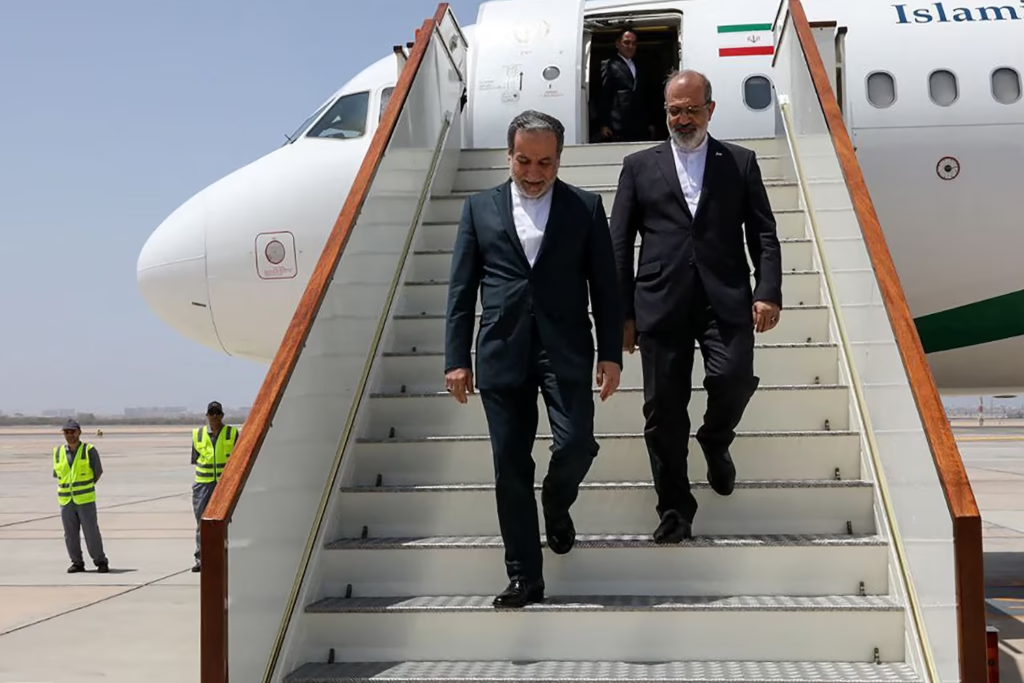In a significant development, Iranian Foreign Minister Abbas Araghchi has arrived in Muscat, Oman, to attend the fourth round of indirect talks between Iran and the United States regarding Tehran’s nuclear program. The diplomatic engagement, reported by the official Islamic Republic News Agency (IRNA), comes ahead of U.S. President Donald Trump’s planned visit to the Middle East. These talks are expected to play a pivotal role in the future trajectory of international relations in the region, particularly in relation to Iran’s nuclear ambitions.
The backdrop of these negotiations is a tense one, with both countries deeply entrenched in their positions over Iran’s nuclear capabilities. The Iranian government, represented by Araghchi, has consistently asserted that its nuclear program is peaceful in nature and primarily focused on energy production and scientific advancement. However, the U.S. has long expressed concerns over Iran’s potential to develop nuclear weapons, leading to a complex and often contentious series of negotiations, especially since the U.S. withdrawal from the Joint Comprehensive Plan of Action (JCPOA) under former President Donald Trump in 2018.
Araghchi’s arrival in Muscat marks a new chapter in this ongoing saga, as the U.S. and Iran engage in yet another round of talks aimed at resolving their differences. Before departing for Oman, Araghchi voiced cautious optimism, stating that he hoped this round of talks would reach a “decisive” point. He acknowledged the challenges inherent in these negotiations, notably the shifting positions of the United States, which he described as a major obstacle to progress. “One of the problems with the negotiations is the constant change of American’s positions,” he said, underlining the frustrations Tehran has faced in trying to secure a lasting agreement.
A key point in the Iranian foreign minister’s statement was his firm stance on the nuclear issue. “All aspects of our nuclear program are peaceful and will not be negotiable or tradable,” he emphasized, reinforcing Iran’s position that its nuclear activities are intended for non-military purposes. He also made a pointed reference to the sacrifices made by Iranian scientists, noting that “the blood of our scientists has been shed for enrichment,” a reminder of the challenges Iran has faced in developing its nuclear capabilities under the scrutiny of international sanctions and pressure. This strong statement serves as a clear signal from Tehran that any attempt to curtail its nuclear program will not be easily accepted.
The atmosphere around these talks is heavy with anticipation, as they come at a critical juncture. The U.S. and Iran have a long history of distrust, dating back decades, and any progress made in these negotiations will require careful diplomacy from both sides. Despite the apparent deadlock in previous rounds of talks, there is still hope that a breakthrough can be achieved, particularly with President Trump’s looming visit to the region. His presence in the Middle East has raised questions about the timing and potential impact of the negotiations. Observers are keenly watching how these talks may shape the diplomatic landscape, with some speculating that Trump’s visit could bring added urgency to the discussions.
The timing of these talks is also significant in light of the broader geopolitical situation in the Middle East. The region has seen a surge in tensions in recent years, particularly in relation to Iran’s activities and its involvement in regional conflicts. The United States has made it clear that it seeks to curb Iran’s influence in the region, which includes addressing concerns over Tehran’s missile development, its support for militant groups, and its nuclear program. However, Iran has repeatedly stated that its actions are in defense of its sovereignty and that it will not be dictated to by outside powers.
The diplomatic process in Muscat, Oman, reflects a long-standing tradition of using third-party mediation to resolve international conflicts. Oman has historically played a neutral role in Middle Eastern diplomacy, and its involvement in hosting these talks highlights its status as a trusted mediator. Omani officials have been careful to ensure that the talks remain focused on finding a peaceful resolution to the nuclear issue, despite the larger geopolitical dynamics at play. Oman’s role as an intermediary underscores its desire to foster stability in a region that has long been marred by conflict and distrust.
As the talks continue, the international community is watching closely, with many hoping that a new agreement could help stabilize the situation and prevent further escalation. The potential for a deal between the U.S. and Iran remains uncertain, but the ongoing dialogue signals that both sides are still willing to engage. While the U.S. remains cautious about Iran’s nuclear intentions, Iran is adamant that its program is for peaceful purposes and that any agreement should respect its right to pursue nuclear technology.
The Trump administration’s stance on Iran’s nuclear program has fluctuated since the U.S. withdrawal from the JCPOA, with some officials advocating for a more aggressive approach while others push for diplomatic engagement. President Trump’s recent comments on the importance of pursuing peace have added another layer of complexity to the negotiations, as his administration faces increasing pressure from international allies and domestic critics alike to find a resolution that addresses both Iran’s nuclear activities and its broader role in the Middle East.
As the talks move forward, both sides are likely to face significant challenges. For Iran, the central issue remains the recognition of its right to develop nuclear technology for peaceful purposes, while the U.S. insists on stringent measures to ensure that Iran’s nuclear program cannot be used for military purposes. The stakes are high, as a failure to reach an agreement could lead to further tensions and possibly more sanctions or military confrontations in the region.
While the outcome of these talks remains uncertain, there is still hope that diplomacy can prevail. Both the U.S. and Iran have expressed a willingness to continue the conversation, and the role of third-party mediators like Oman may prove crucial in finding a path forward. Ultimately, the success of these talks will depend on the ability of both sides to find common ground and address the underlying issues that have kept them at odds for so long.
The international community will continue to watch the situation in Muscat closely, as the potential for a resolution to the Iran nuclear issue could have far-reaching consequences for the stability of the Middle East and beyond. In the coming days and weeks, the outcome of these talks will likely shape the future of U.S.-Iran relations, with global implications for nuclear non-proliferation, regional security, and international diplomacy.
As the negotiations continue, one thing is clear: the quest for peace in the Middle East is far from over, and these talks may be one of the most significant steps toward achieving that goal.


